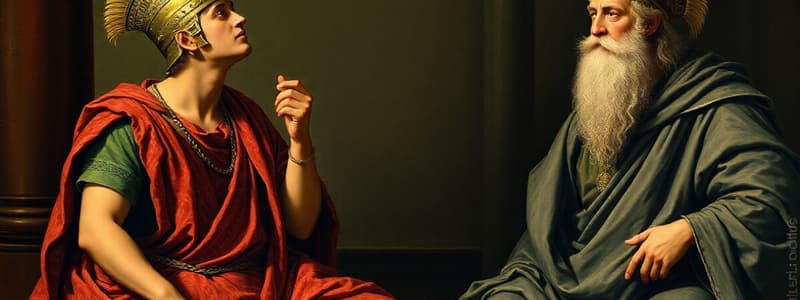Podcast
Questions and Answers
How did Constantine's conversion to Christianity and relocation of the Roman capital impact the empire?
How did Constantine's conversion to Christianity and relocation of the Roman capital impact the empire?
- The Western regions faced invasions while the Eastern regions prospered. (correct)
- It prompted immediate peace and economic stability throughout the entire empire.
- It caused the Western and Eastern regions to unify under a single religious identity.
- It led to a decline in the Eastern regions due to religious conflicts.
What was the primary goal of Emperor Julian, known as the Apostate?
What was the primary goal of Emperor Julian, known as the Apostate?
- To divide the Roman Empire into Western and Eastern halves.
- To expand the Roman Empire's territory through military conquests.
- To revert the Roman Empire back to paganism. (correct)
- To establish Christianity as the sole religion of the Roman Empire.
How did the arrival of the Huns influence the events leading to the Battle of Adrianople?
How did the arrival of the Huns influence the events leading to the Battle of Adrianople?
- The Huns pushed the Goths into the Roman Empire, causing unrest and rebellion. (correct)
- The Huns allied with the Roman Empire to defend against Germanic tribes.
- The Huns negotiated a peaceful settlement between the Goths and the Roman Empire.
- The Huns directly attacked the Roman army at Adrianople, leading to Valens's death.
Why is Emperor Theodosius considered a significant figure in Roman history?
Why is Emperor Theodosius considered a significant figure in Roman history?
If Emperor Julian had succeeded in restoring paganism, how might this have affected the subsequent events involving Valens and Theodosius?
If Emperor Julian had succeeded in restoring paganism, how might this have affected the subsequent events involving Valens and Theodosius?
Justinian's primary goal upon ascending to the throne in 527 was to:
Justinian's primary goal upon ascending to the throne in 527 was to:
What was the significance of Justinian's codification of Roman laws?
What was the significance of Justinian's codification of Roman laws?
Which legal principle, now common in modern judicial systems, was introduced under Justinian's rule?
Which legal principle, now common in modern judicial systems, was introduced under Justinian's rule?
What was the Corpus Juris Civilis?
What was the Corpus Juris Civilis?
How did Justinian ensure fair treatment of individuals within his empire through legal reforms?
How did Justinian ensure fair treatment of individuals within his empire through legal reforms?
Flashcards
Constantine
Constantine
Emperor who converted to Christianity in 312 CE and moved the Roman capital to Constantinople in 330 CE.
Julian the Apostate
Julian the Apostate
Emperor from 360-363 CE who attempted to restore paganism (non-Jewish/Christian religions) to the Roman Empire.
Huns
Huns
A nomadic group from Asia who pushed the Goths into the Roman Empire.
Battle of Adrianople
Battle of Adrianople
Signup and view all the flashcards
Theodosius the Great
Theodosius the Great
Signup and view all the flashcards
Byzantine Empire
Byzantine Empire
Signup and view all the flashcards
Justinian's Goal
Justinian's Goal
Signup and view all the flashcards
Justinian's Code of Laws
Justinian's Code of Laws
Signup and view all the flashcards
Innocent Until Proven Guilty
Innocent Until Proven Guilty
Signup and view all the flashcards
Impact of Justinian's Code
Impact of Justinian's Code
Signup and view all the flashcards
Study Notes
- Most emperors after Constantine are not well-known, with Justinian being a notable exception.
Effects of Constantine
- Constantine's conversion to Christianity in 312 CE and the relocation of the Roman capital to Constantinople in 330 CE led to significant changes in the Roman Empire.
- The Western Roman Empire faced continuous invasions from Germanic tribes, while the Eastern regions prospered.
Julian the Apostate
- Emperor Julian reigned from 360-363 CE, known for trying to restore paganism (any religion other than Judaism or Christianity) to the Empire.
- Julian attempted to reverse Constantine's Christian reforms and revive the worship of old gods.
- His efforts to restore paganism were ultimately overturned by his successor, Jovian, due to the strong entrenchment of Christianity.
Valens and Adrianople
- The Huns, a warlike group from Asia, migrated into Europe, pushing the Goths, Germanic tribes, into the Roman Empire.
- The Empire allowed the Goths into their lands as refugees.
- The Germanic Goths later rebelled and defeated the Roman army in the 378 CE Battle of Adrianople, during which Emperor Valens was killed.
Theodosius
- Emperor Theodosius, who reigned from 379-395 CE, was the last emperor to rule both the Western and Eastern halves of the Empire.
- His reign was marked by violence, with harsh punishments for those who opposed him or his forces.
- Despite his violent tendencies, he is often called Theodosius the Great for holding the Empire together during a turbulent period.
Justinian
- By the time Justinian came to power in 527 CE, the Eastern Roman Empire was called the Byzantine Empire.
- Justinian aimed to restore the Empire to its former glory.
- He sent his military to reclaim much of the Western Empire, including Italy and Rome.
- Justinian valued the laws of ancient Rome and ordered them to be recorded, categorizing, simplifying, and removing outdated laws.
- He introduced new laws to ensure fair treatment, including the principle of "innocent until proven guilty."
- Justinian's new laws, along with ancient Roman laws, formed the Corpus of Civil Law or Justinian's Code of Laws, completed around 529 CE.
- These laws have served as the foundation for judicial systems in the Western world.
- Justinian's influence is considered strong and long-lasting.
Studying That Suits You
Use AI to generate personalized quizzes and flashcards to suit your learning preferences.




